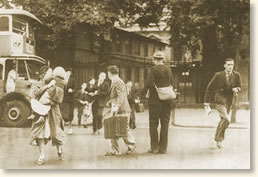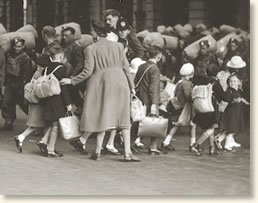|
London Goes to War, 1939
Tension filled London's air on that sunny, sultry morning of Sunday September 3, 1939. Would war come to Britain? This threat had been raised earlier in the year when Hitler occupied Czechoslovakia. Now, it seemed to be turning into reality. Two days earlier Hitler had unleashed the world's first blitzkrieg as German air and ground forces swarmed across the Polish border. In

Londoners scurry to find shelter
as an air raid siren wails
September 3, 1939 |
response, Prime Minister Neville Chamberlain presented an ultimatum to Germany
in the early hours of that Sunday morning: cease the invasion of Poland or face
war with Great Britain (see "The Beginning of
World War II, 1939"). Hitler's reaction was to ignore Britain's
ultimatum.
At 11:15 AM The Prime Minister interrupted the regular radio broadcasts to announce that Britain and Germany were at war. At 11:27 AM London's air raid sirens began to wail. It was only a test, but unlike the many tests that had been conducted before, this one struck home - the country really was at war. Sandbags were hastily filled to protect important buildings, gas masks became required equipment for civilians, the nightly blackout became a way of life and children were herded aboard evacuation trains to escape the danger of the city.
Mollie Panter-Downes was an English novelist who wrote about life in London for the New Yorker Magazine. She filed this dispatch with the magazine on that first day of war in London:
"September 3, 1939
On the stretch of green turf by Knightsbridge Barracks, which used to be the scampering ground for the smartest terriers in London, has appeared a row of steam shovels that bite out mouthfuls of earth, hoist it aloft, and dump it into lorries; it is then carted away to fill sandbags. The eye has now become accustomed to sandbags everywhere, and to the balloon barrage, the trap for enemy planes, which one morning spread over the sky like some form of silvery dermatitis.
Gas masks have suddenly become part of everyday civilian equipment and everybody is carrying the square cardboard cartons that look as though they might contain a pound of grapes for a sick friend. Bowlegged admirals stump jauntily up Whitehall with their gas masks slung neatly in knapsacks over their shoulders. Last night London was completely blacked out. A few cars crawled through the streets with one headlight out and the other hooded while Londoners, suddenly become homebodies...
The evacuation of London, which is to be spaced over three days, began yesterday and was apparently a triumph for all concerned. At seven o'clock in the morning all inward traffic was stopped and A.A. scouts raced through the suburbs whisking shrouds of sacking off imposing bulletin boards, which informed motorists that all the principal routes out of town were one-way streets for three days. Cars poured out pretty steadily all day yesterday and today, packed with people, luggage, children's perambulators, and domestic pets, but the congestion at busy points was no worse than it is at any other time in the holiday season. The railways, whose workers had been on the verge of going out on strike when the crisis came, played their part nobly and the London stations, accustomed to receiving trainloads of child refugees from the Third Reich, got down to the job of dispatching trainload after trainload of children the other way-this time, cheerful little cockneys who ordinarily get to the country perhaps once a year on the local church outing and could hardly believe the luck that was sending them now. Left behind, the mothers stood around rather listlessly at street corners waiting for the telegrams that were to be posted up at the various schools to tell them where their children were.
Although the summer holiday is still on, village schools have reopened as centers where the evacuated hordes from London can be rested, sorted out, medically examined, refreshed with tea and biscuits, and distributed to their new homes. The war has brought

At a London train station, children
are sheparded aboard an outgoing
evacuation train. Behind them, troops
disembark from an arriving train.
|
the great unwashed right into the bosoms of the great washed; while determined ladies in white V.A.D. overalls search the mothers' heads with a knitting needle for unwelcome signs of life, the babies are dandled and patted on their often grimy diapers by other ladies, who have been told to act as hostesses and keep the guests from pining for Shoreditch. Guest rooms have been cleared of Crown Derby knickknacks and the best guest towels, and the big houses and cottages alike are trying to overcome the traditional British dislike of strangers, who may, for all anybody knows, be parked in them for a matter of years, not weeks.
Today was a day of unprecedented activity in the air. Squadrons of bombers bustled in all directions and at midday an enormous number of vast planes, to which the knowing pointed as troop-carriers, droned overhead toward an unknown destination that was said by two sections of opinion to be (a) France and (b) Poland. On the ground, motor buses full of troops in bursting good humor tore through the villages, the men waving at the girls and howling "Tipperary" and other ominously dated ditties that everybody has suddenly remembered and found to be as good for a war in 1939 as they were in 1914
London and the country are buzzing with rumors, a favorite one being that Hitler carries a gun in his pocket and means to shoot himself if things don't go too well; another school of thought favors the version that he is now insane and Goring has taken over...The English were a peace-loving nation up to two days ago, but now it is pretty widely felt that the sooner we really get down to the job, the better."
References:
Mollie Panter-Downes' letter was originally published in the New Yorker Magazine on September 9, 1939, republished in The New Yorker Book of War Pieces (1947).
How To Cite This Article:
"London Goes to War, 1939," EyeWitness to History, www.eyewitnesstohistory.com (2005).
|






